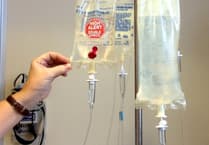Heartbreaking figures released by RSPCA Cymru have shown reports of intentional harm has risen by 9% in Wales with incidents peaking during the summer months.
Reports for the number of intentional harm figures for Powys have were at 18 in 2020, before they skyrocketed up to 27 the following year in 2021.
In 2022, numbers of intentional harm reports in Powys decreased slightly to 24.
However, they are back on the rise in 2023 as RSPCA Cymru has already had 24 reports of intentional harm to animals from January to May.
The numbers expected to rise this summer with more people reporting cruelty to animals from July to September.
The charity has launched its Cancel Out Cruelty campaign, to raise funds to help its frontline rescue teams continue to save animals from cruelty and abuse and to raise awareness about how to stop cruelty to animals for good.
Data released by the charity shows that calls relating to international harm in Wales over the past three years have increased from 691 (2021) to 753 last year (2022) - a 9% increase.
RSPCA Cymru recorded 264 complaints of alleged cruelty to animals in Powys in 2022.
162 of the calls in Powys were reports of animal neglect; 50 of the reports were animals being left unattended; 24 cases of intentional harm to animals; 13 reports of illegal activity involving animals; 11 reports of abandonment; and there were four reports of animals being trapped.
Dermot Murphy, RSPCA inspectorate commissioner, said: “Right now, animal cruelty is happening in England and Wales on a massive scale and rising. It is heartbreaking that we are seeing such sad figures which show animal cruelty is, very sadly, on the rise.
“While we don’t know for certain why there has been an increase in reports of cruelty, the cost of living crisis and the post-pandemic world we live in has created an animal welfare crisis with more people getting pets with potentially less time and money to care for them.
“Each year, these reports of cruelty reach its terrible annual peak in the summer months – when we receive a report of an animal being beaten on average every hour of every day.
“The cost-of-living crisis also means the cost of rescuing animals is at an all-time high and our vital services are stretched to the limit.”
It is not known why reports of animal cruelty peak in the summer months although factors like animal abuse being more visible as people are outdoors more, could be one factor.
The RSPCA is the only charity rescuing animals and investigating cruelty in England and Wales with a team of frontline rescue officers, specialist vet teams and a network of animal care centres and 140 branches providing rehabilitation to animal victims.
Dermot added: “Together, we believe we can and will cancel out cruelty to animals by replacing violence with kindness. We are urging people to donate to our Cancel Out Cruelty campaign,every donation will help animals.”



-with-friends.jpeg?width=209&height=140&crop=209:145,smart&quality=75)

Comments
This article has no comments yet. Be the first to leave a comment.